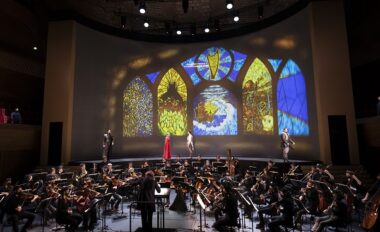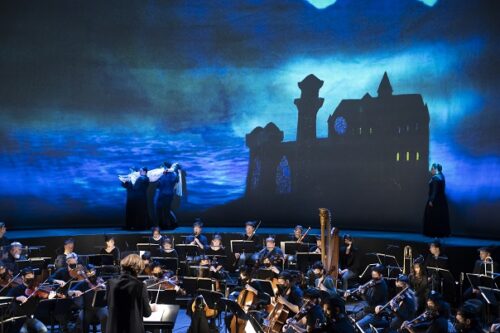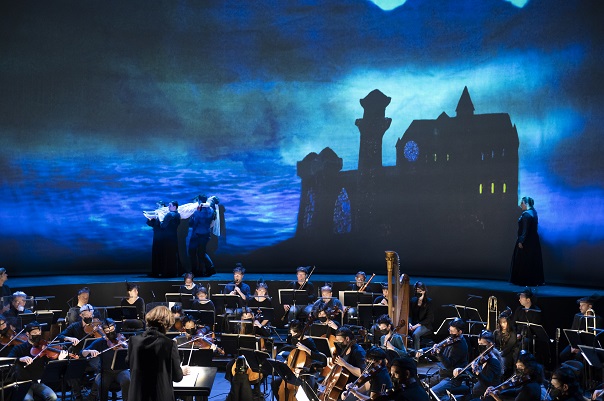 France R. Schumann, La Nuit des Rois: Soloists, accentus, Insula / Laurence Equilbey (conductor). Auditorium Patrick Devedjian, La Seine Musicale, Paris, 15.5.2023. (CC)
France R. Schumann, La Nuit des Rois: Soloists, accentus, Insula / Laurence Equilbey (conductor). Auditorium Patrick Devedjian, La Seine Musicale, Paris, 15.5.2023. (CC)

Creatives:
Staging – Antonin Baudry
Video – Anatole Levilain-Clément
Costumes – Pétronille Salomé
Dramaturgy – Youness Anzane
Scenography – Emmanuelle Favre
Lighting – Cécile Trelluyer
Choreography – Marion Lévy, Chrystel Calvet
Cast:
Ric Furman – The Page, A Young Man
Rachel Frenkel – Narrator
Tommi Hakala – Harpist, Triton
Rafał Pawnuk – The King
Camille Schnoor – The Queen
Adèle Clermont – The Princess
Ellen Glacone – The Nymph
Sébastien Brohler – Minstrel
R. Schumann – Vom Pagen und der Königstochter (1852); Des Sängers Fluch (1852); Nachtlied, Op.108 (1849)
Beethoven – Leonore Prohaska – Trauermarsch; König Stephan – Geistlicher Marsch
The sheer imagination of Insula’s presentations is mindboggling, from the Pastoral for the Planet (review click here) to their astonishing take on Mozart’s Requiem.
This time, it was the turn of two of the late ballads of Robert Schumann in the form of the ‘The Night of Kings’ (La Nuit des Rois); expansive tales indeed – the booklet note for the concert memorably refers to them as ‘frescoes’ – that lend themselves perfectly to the world of legend and, with Kings, Queens, Princes and Princesses, the land of the fairy tale and, here, royal intrigue. Love and curses, not to mention murders, populate this magical, medieval universe. We have seen before how expert Insula is with the idea of projections, of setting up almost immersive scenography, in Mozart, une journée particulaire (review click here).
From the beginning it was Laurence Equilbey’s intention to conduct these pieces in a highly dramatic presentation; she chose as collaborator Antonin Baudry, who had enjoyed a significant career as a diplomat (which fits the political undertones of the tales!). He shifted career to film-maker, and Equilbey saw his movie The Wolf’s Call. Baudry also created the comic strip Quai d’Orsay under the pseudonym Abel Balzac, which is highly relevant to the slightly comic book aspect of the projection. Right from the off, the senses are assaulted by sound and colour – and yet Schumann’s music absolutely holds its own thanks to the dynamic thrust of Equilbey’s direction and early on, accentus (Equilbey’s world-class choir) assert their presence.
Schumann’s pieces had never been set in this manner previously. The stage was divided into several ‘partitions’ – one where prince and page meet, for example, another for the Narrator. As in Une Journée particulaire (another of Insula’s projects) there is a gauze screen towards the back of the stage onto which the images are projected; and, again, the space behind the gauze is lit and characters appear there, too. Shadow play is also an interesting and integral part of the argument. All of this in effect gives several levels of (un-)reality, as the participants can move between ‘levels’ of fantasy, from basically interacting within or around the orchestra, to interacting with the projections.

The effect is spectacular – when the Narrator, the superbly strong (yet warm-toned) mezzo Rachel Frenkel, describes the hunt and chase against vibrant moving images, heard on conjunction with the superb Insula orchestra (horns resplendent) the effect is unforgettable. That is but one example: there is the most remarkable magic castle and, of course, that archetypal Romantic image of the forest. Visual colour is perfectly judged to feel radiant but at a distance – a distance back into an ancient time.
Costumes (Pétronille Salomé) were perfectly judged for the fairy tale scenario. The sense of immersion is important, perhaps on a deeper psychological level for audience’s experience. Fairy tales offer a rich vein of psychological material (the work of Marina Warner is particularly important in this field, and of course Karl Jung was more than aware of the potency of their imagery).
This staging, heard first in May 2021, was Insula’s first experience with Schumann (we have since reported on a wonderful Schumann ‘Spring’ Symphony by Insula here). The clear importance of period instruments is everywhere apparent: Schumann’s scoring, so often criticised, is impeccable., with Equilbey realising each micro-change of colour, including remarkably dark areas (we really are not far from the world of Der Freischütz here, and Schumann’s works do not suffer in the comparison). Fascinating to see the two pairs of horns (one pair crooked, one pair valved) in two rows and to hear how Schumann’s simply massive harmonic palette comes to life. Stabbing inner strings were perfectly judged (and would be lost with a modern orchestra). What was more remarkable still was how at one point a funeral march is required, and we move seamlessly to an insert of two lesser-known works by Beethoven (the ‘Trauermarsch’ from Leonore Prohaska, performed with rock-steady rhythmic force against a projection of a magic mountain, and the ‘Geistlicher Marsch’ from King Stephen, Op.117, which acted as the music for a radiant sunrise). The atmosphere was uninterrupted – the story’s trajectory perfect. The outpourings of Schumann’s Des Sängers Fluch made their full mark; the final choral Nachtlied, against projections of a darkening, crepuscular scene of mountains and water, the perfect end, especially given the perfect musical congruence between Insula and accentus.
The choice of soloists seemed ideal. Perhaps the magnificently rich, deep bass of Rafał Pawnuk (as the King) remains firmly lodged in the memory, but Adèle Clermont’s superbly fresh-voiced Princess (dressed in virginal white) was an absolute joy, and arguably the true star of the evening. Nice to have the two soprano voices nicely differentiated, Camille Schnoor (as the Queen) somewhat warmer. Tenor Ric Furman was a strong Page, baritone Tommi Hakala a finely-focused Triton, while Frenkel’s almost Erda-like narration towards the close was incredibly impressive.
The sheer imagination and expertise of this project is immense. On a technical level, Anatole Levilain-Clément’s video is a masterpiece in and of itself, while Baudry’s overall conception is incredibly consistent and consistently imaginative; and the whole is lit with true expertise by Cécile Trelluyer.
The projects of Insula and Laurence Equilbey offer true musical highpoints of any season – long may they continue.
Colin Clarke
